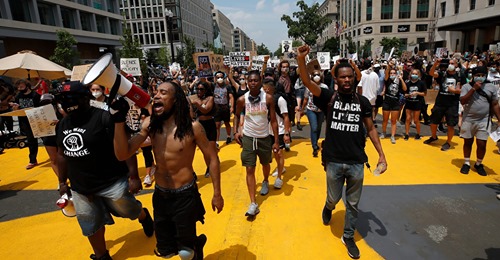WASHINGTON – Perry Green doesn’t believe that Joe Biden is listening to what young, Black Americans want right now.
Across the country, young people are protesting systemic racism and calling on political leaders to reallocate funding from local police to other community resources. Green, who is Black, criticized Biden for not supporting the “Defund the Police” movement that many activists support.
“You got Black youth across the country, calling for defunding the police and thinking differently about law enforcement, and … a couple days later, in the midst of all the protests … (Biden’s) campaign says ‘Let’s spend more money on community policing,'” Green told USA TODAY.
Green, 34, lives in Alameda, California, and said he’s still undecided on whether he will vote for Biden after supporting Sen. Bernie Sanders in the Democratic primary. But he added if he was living in a swing state like Ohio, Michigan or Pennsylvania, he would be voting for Biden.
“I think that if I were to see the campaign attempt to engage with more grassroots leaders, that would make me feel a little more encouraged about voting for Biden,” Green said.
With the November election four months away, polling shows Biden’s support with younger Black voters trailing significantly behind that of older Black voters. And while polls show the majority of young Black voters support Biden over President Donald Trump, many are unenthusiastic at best or hesitant at worst.
Black voters of all ages have been a pillar of the Democratic party’s coalition for decades and strong turnout from the Black community, particularly in key battleground states such as Michigan and Florida, will be key for Biden to take the White House in November.
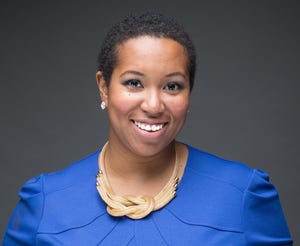
“I think this is a time for Joe Biden to be explicitly clear on his stances,” said Stefanie Brown James, who led Obama for America’s effort to engage African American leaders and voters in 2012. “Don’t skirt around the issue. Talk to these young people directly, and then have policies that he’s championing to show how he wants to push for this progressive change to happen.”
Data shows split between older and younger Black voters
Younger voters who came of age during President Obama’s administration, where Biden was vice president, have higher expectations of their politicians, and likely want to see a more progressive Democrat in office, said Chryl Laird, assistant professor of government at Bowdoin College and author of “Steadfast Democrats: How Social Forces Shape Black Political Behavior.”
“(Young Black voters) are going to have some reservations about Joe Biden,” Laird said, adding that Biden represents “a very clear image of a status quo politician within the Democratic Party.”
Older voters, and particularly older Black voters, are more pragmatic when it comes to deciding who to vote for because they have seen that change takes time, Laird said.
Biden has had “moments of problematic commentary or statements,” Laird said. “And they don’t really see him as the direction that takes the party in a more progressive lean.”
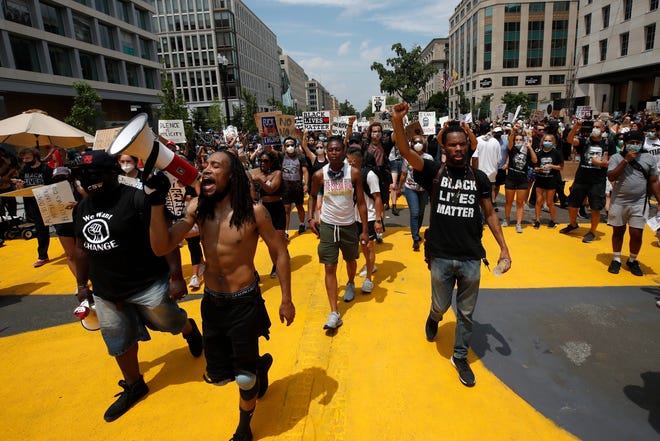
Still, voting for the Democratic candidate is the norm within the Black community, Laird said, and young Black voters will likely fall in line. A Pew Research Center study this year found that the majority (68%) of Black Democrats described themselves as either moderate or conservative. But in 2016, for example, 89% of all Black voters supported Democratic nominee Hillary Clinton.
“I don’t imagine any (young Black voters) going to vote, if they are planning to vote, and voting for Donald Trump,” she said, adding that they will likely vote for Biden but not be happy about it.
James noted it’s “a critical year for young Black voters to be engaged and feel as though they are a part of the process.” Because young voters “are not waiting” and will “move forward how they feel is best,” James said, it’s crucial for Biden to take a step back and meet with young activists in this moment.
“Being able to say, in no minced words, ‘Yes, I know that Black lives matter because x, y, and z,’ ” is important, said James, who is also CEO of Vestige Strategies and co-founder of Collective PAC.
Aerial Langston, 31, said she will likely vote for Biden in November because the alternative would be voting for the current president. But Langston, who is from Houston, Texas, also said she would like to see Biden be more cautious with his words.
“I need someone who could carry America with a little bit more dignity and I won’t be so ashamed to be like, ‘Oh, that’s my president. Period,’ ” she said.
Amid nationwide protests against police brutality and systemic racism, young Black voters, who have taken the lead in many of the demonstrations, are more skeptical of Biden, according to an analysis from the Democracy Fund + UCLA Nationscape project published in May in the Washington Post.
The analysis found:
- 91% of Black voters 65 and up said they plan to vote for Biden.
- 68% of Black voters from ages 18 to 29 said they planned to vote for Biden – more than 20 percentage points fewer than Black voters 65 and up
- In the 2016 election, Democrat Hillary Clinton drew 85% of young Black voter support, and won 93% of Black seniors.
- 13% of Black voters ages 18 to 29 said they plan to vote for Trump.
A recent Washington Post/Ipsos poll published in June found that 92% of Black registered voters said they plan to vote for Biden in November. But it was a near even split as to why: 50% of the Black registered voters surveyed said it was mainly because they oppose Trump, while 49% said they mainly support Biden.
The age schism is softened by the fact that older voters, across demographic groups, vote at much higher rates than younger voters.
In 2016, about 70% of voters 65 and up cast ballot, while about 46% of voters ages 18 to 29 turned out to vote, according to data from the Census Bureau. Among African American voters, the voting rates are similar, with young Black voter turnout at about 46% and voter turnout for Black voters 65 and up at 71% in 2016, according to the Census Bureau.
History, recent comments draw criticism from young Black Americans
In the early weeks of the Democratic primary contests, Biden was badly trailing Sanders. But overwhelming support from Black voters, particularly older Black voters, delivered Biden a stunning turnaround in South Carolina.
Biden often touted his record and ties to the African American community during the primary. But parts of his record have come under criticism.
As a former chairman of the Judiciary Committee, Biden promoted the 1994 crime legislation that included the Violence Against Women Act and authorized billions in funding for more police and prisons. Biden also previously worked on anti-crime legislation with the late Sen. Strom Thurmond, R-S.C., a longtime segregationist who ran for president in 1948 as a Dixiecrat.
Several of Biden’s rivals in the Democratic primary, including Sens. Kamala Harris, D-Calif., and Cory Booker, D-N.J., pointed to 1994 crime bill’s long-term impacts on the Black community, particularly its contribution to mass incarceration.
Recently, Biden had a testy exchange during an interviewwith radio host Charlamagne Tha God on his popular morning radio show, “The Breakfast Club.”
The conversation in May lasted nearly 20 minutes and ended with a gaffe that the former vice president had to apologize for hours later.
“If you have a problem figuring out whether you’re for me or Trump, then you ain’t black,” Biden told Charlamagne after the radio host urged Biden to visit New York to continue the discussion. Biden later that day said he regretted the comments, saying he “should not have been so cavalier.”
“I’ve never, never, ever taken the African American community for granted,” Biden said on a call with members of the U.S. Black Chambers Inc., a group that advocates for Black business leaders.
Rep. James Clyburn, D-S.C., a staunch Biden supporter, said he “cringed” at the former vice president’s comments. He said he knows that Biden is not perfect but said he should be compared “to the alternative, not the Almighty.”
Biden has also said he doesn’t support defunding the police, which protesters and activists have called for, but supports the “urgent need for reform,” including funding for public schools, summer programs and mental health and substance abuse treatment “separate from funding for policing,” so officers “can focus on the job of policing.”
And after committing to having a woman as his vice presidential choice, Biden is facing increasing calls for that woman to be a woman of color.
“African American voters, particularly African American women voters, are crucial to the road to the White House,” Marc Morial, president of National Urban League, told USA TODAY earlier this year. “I just believe that anyone running for president today is a fool to ignore Black voters, particularly Black women voters.”
But Biden is trying to find ways to engage young Black voters.
Earlier this month, Biden’s campaign launched a grassroots group called “Black Students for Biden.” The campaign also launched an HBCU Students for Biden earlier this year to activate student organizers at Historically Black Colleges and Universities (HBCUs) across the country.
Is Biden’s connection to Obama a strength?
The recent protests against police violence and systemic racism have again highlighted Biden’s different relationships with younger and older Black voters.
In Washington, D.C., Paul Talbert was among hundreds of protesters who marched to the U.S. Capitol in June. He said he still believes Sanders was “the correct choice for Black folks, for younger Black voters like myself.” He noted he was going to vote in November but would not say if he was going to vote for Biden.
“I won’t vote for Donald Trump,” Talbert, 28, said. He criticized Biden as trying to ride on Obama’s coattails.
“I think that whole Obama thing, it got the older generation really going,” he said.
Cassandra Dalmida, 19, also said she doesn’t want Biden “to piggyback off of Barack Obama.” Dalmida said she is going to vote in November, but has not committed to the former vice president yet.
“Honestly, I want him to not bring up Obama at all,” said Dalmida, who is from Orlando, Florida. Dalmida noted she would vote for Biden if he can convince her that he will implement changes that would combat systemic racism across the nation.
More:US voter registration plummets during coronavirus pandemic, challenging both parties
But some older Black voters like Biden’s association with the Obama administration.
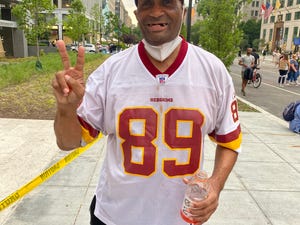
Walter Wiggins, 67, emphatically declared Biden as his candidate, saying he voted for him in the primary and will vote for him in November.
“He was under President Obama, so that’s how I feel about him,” Wiggins said. “He’s a good guy. I respect him.”
Wiggins said Biden will continue to build on Obama’s legacy by strengthening the Affordable Care Act and he believes Biden will help pass a law to address police brutality.
Carolyn Jones, 72, said that if Biden becomes president, she hopes he brings “stability” back to the United States.
“What the country needs is solidarity,” Jones said. “Bring some solidarity, bring some peace. If he doesn’t do anything, just bring some solidarity.”
And not all younger Black voters are holding out on throwing their support for Biden.
Biden wasn’t Stephanie Moore’s first choice. “I’m not in love with the fact that he is the nominee,” she said. But Moore, 49, believes Biden not only has the best chance to beat Trump, he also has the empathy to lead in this moment now.
“We all just need a hug,” she said, “and to hear ‘I’m working for you guys and I know it’s hard, I understand.’ Joe Biden is great at that. I really think that he can start to bridge the gap of hatred and anger and nastiness has just come with a Trump administration.”
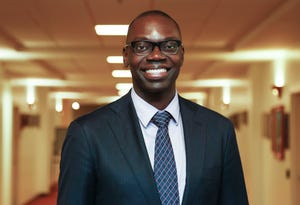
The former vice president has also received support from leading young Black political leaders, such as Michigan Lt. Gov. Garlin Gilchrist.
Gilchrist, who endorsed Biden in early March, said he knows how many young Black voters feel at the moment.
Gilchrist, 37, voted for Sanders during the 2016 Michigan primary. But he threw his support to Biden in part because of the plans he has set forward and also because the former vice president “has … always surrounded himself with young hungry smart, talented people to be successful.”
“He’s someone who clearly recognizes not only the generational moment that we’re in, but also the fact that we need to empower young people to step into their leadership and step into their power,” Gilchrist said.
Gilchrist praised Biden for stepping up and listening to community leaders at this moment where the entire nation is talking about racism.
“As a young person, I want people who are in the generation ahead of me to recognize my potential and my leadership and give me the opportunity to demonstrate that,” he said.

